PM Modi has arrived in New York and will address the United Nations General Assembly on September 25. The PM is expected to address the COVID-19 challenges, Climate Change and Sustainable Development, a need to fight global terrorism, amongst other topics.
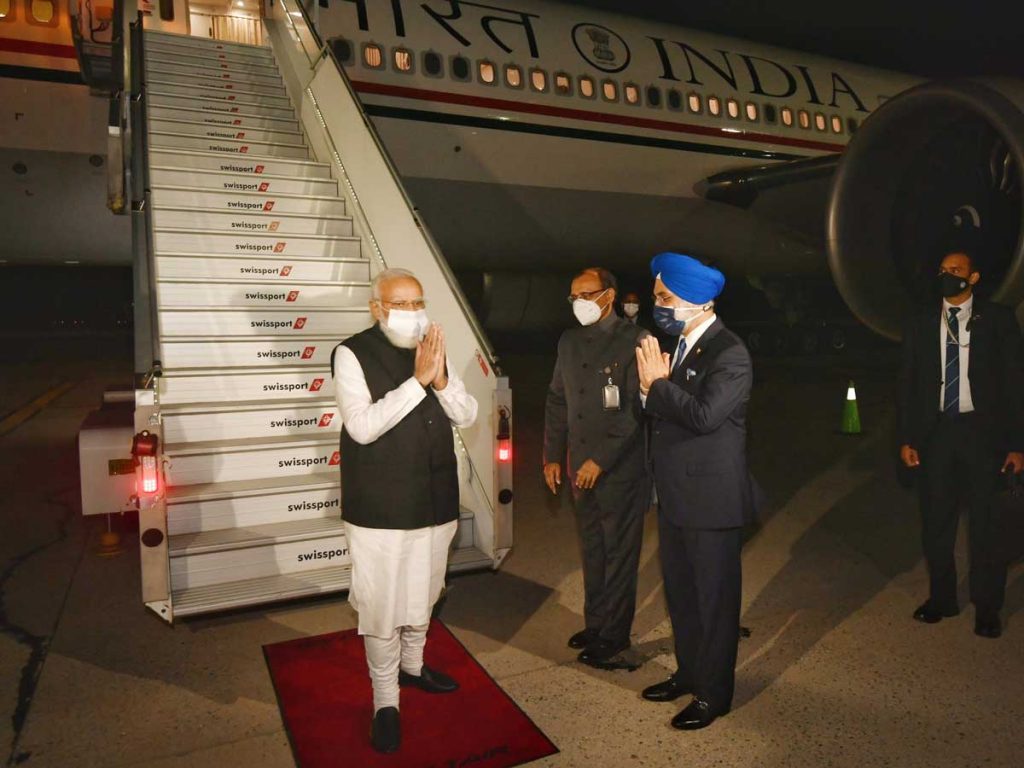
PM Modi has a bilateral meeting with the US President
PM Modi reminisced the time he had talks with then US Vice-President Joe Biden in 2014 and then in 2016 and complimented Mr. Biden on implementing his vision on the India-US relations.
On Security and Defense
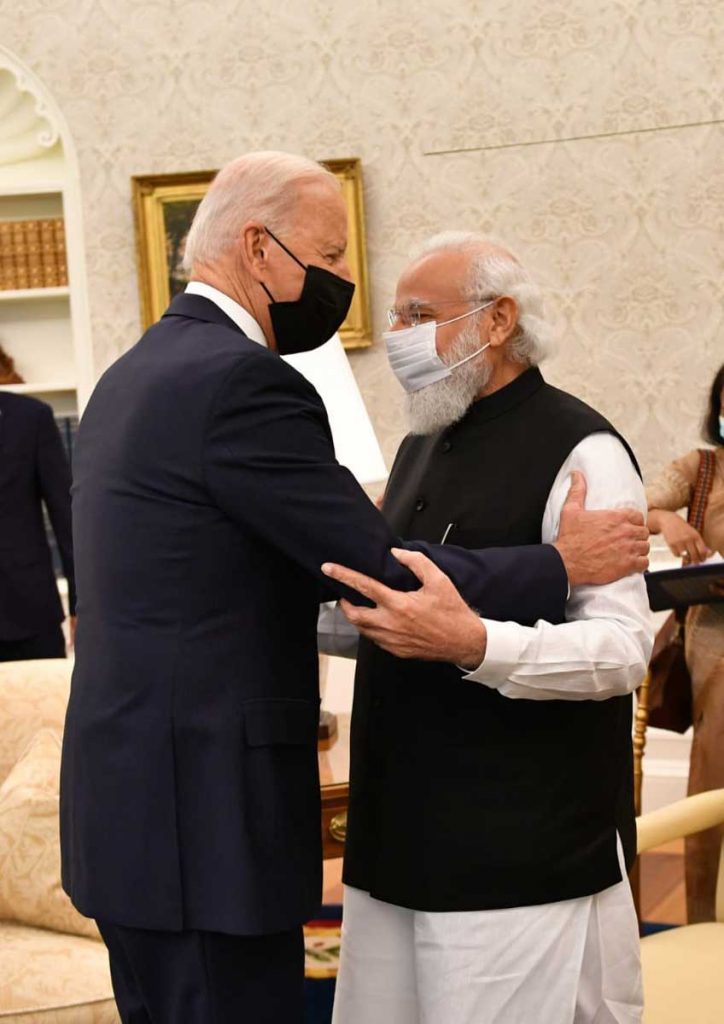
The leaders agreed that while developing the strategic partnership between the world’s largest democracies, the countries will also work within regional groupings such as ASEAN and QUAD to promote shared interests in the Indo-Pacific.
Mr. Biden welcomed the sharing of information and logistics, the military-to-military interactions, and the strengthening cooperation between the countries in advanced military technology.
India and the US have recently agreed to co-develop air-launched UAVs under the ‘Defense Technology and Trade Initiative,’ and both leaders called for further co-operation in co-developing and co-production.
The Leaders welcomed close consultations through the 2+2 Ministerial Dialogue of the Foreign and Defense Ministers of India and the United States that is to be held later this year.
Both countries are to have an inaugural Industrial Security Agreement summit meeting to facilitate high-end defense industrial collaboration.
Fight against Terrorism and concern for Afghanistan
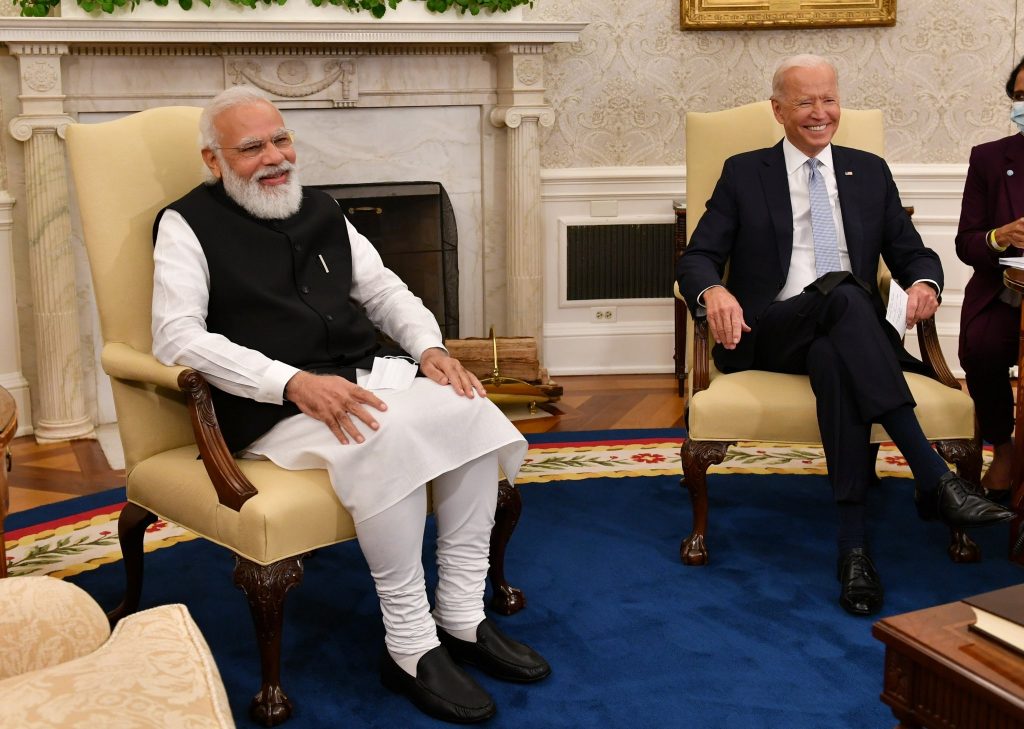
Reiterating their commitment to stand together against terrorism, the leaders vowed to act against the terrorist groups, including groups proscribed by the UNSCR 1267 Sanctions Committee.
They called for the perpetrators of the 26/11 Mumbai attacks to be brought to justice.
Afghanistan must not be a breeding ground for terrorism, the leaders said, asking the Taliban to abide by the UNSC Resolution 2593, which states that the Afghan land must not be used to threaten or attack any country.
The leaders called on the Taliban to facilitate a safe departure of foreigners and the Afghans who are at risk and respect the rights of women, children, and minorities. They asked that the Taliban allow UN humanitarian aid into the country without any hindrance.
Both Mr. Biden and Mr. Modi also looked forward to seeing Myanmar’s return to democracy.
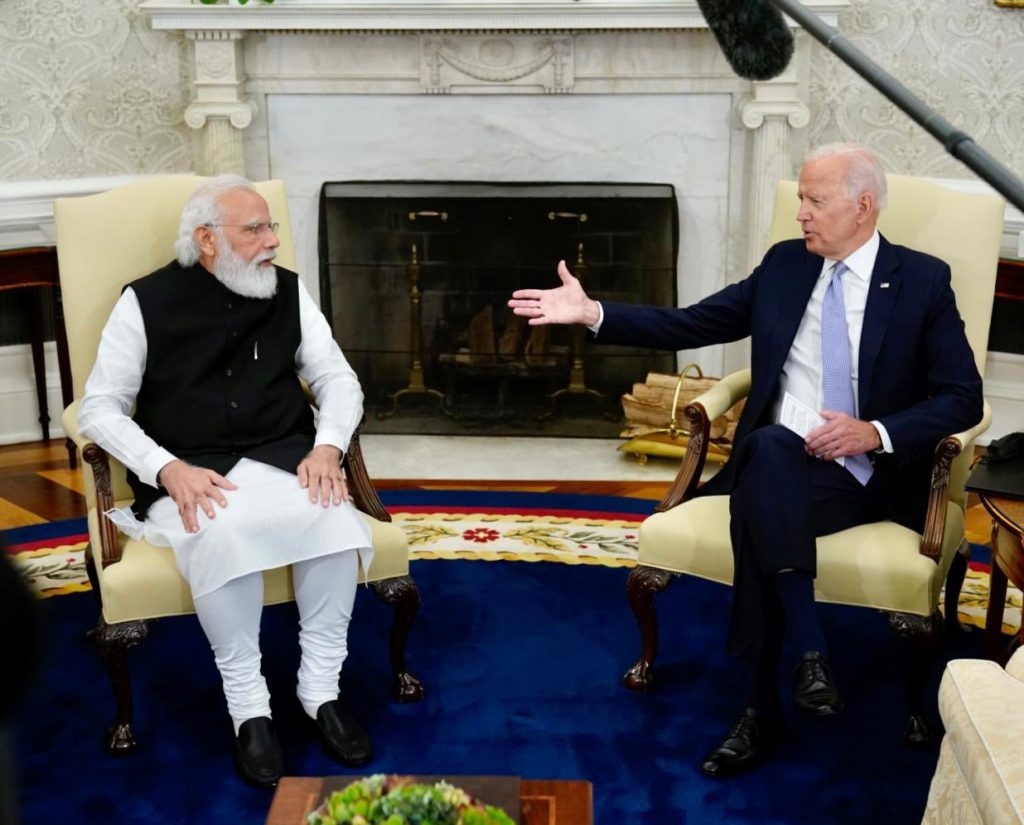
On the COVID-19 Pandemic
India and the US shared resources during the coronavirus pandemic so far, and the leaders vowed to take the cooperation forward.
In the light of the COVID-19 situation and the lessons learned from the pandemic, both leaders stressed the need for a resilient supply chain between the countries..
On Climate Change
PM Modi welcomed America’s return to the Paris Agreement, and President Biden lauded India’s goal of achieving 450 GW of renewable power by 2030.
The US and India will accelerate the production of clean energy under the ‘U.S.-India Climate and Clean Energy Agenda 2030 Partnership.’
The nations will deploy critical technologies to fasten the production of clean energy, it was agreed.
UN Reforms
Applauding India’s leadership during its recent UN Security Council Presidency in August, President Biden reaffirmed America’s support for India’s permanent membership in the security council.
Reforms in the UN, and especially in the Security Council are long sought by India.
The US will also support India’s entry to the Nuclear Suppliers Group, the President said.
On Bilateral Trade and other issues
The Leaders looked forward to the launch of the U.S.-India Gandhi-King Development Foundation to advance cooperation on health, education, and the environment.
They also looked forward to convening the US – India CEO Forum and the ‘Commercial Dialogue’ in early 2022 to realize the full potential of the private sector.
They welcomed the private sector’s contributions in fields such as Pharmaceuticals, Biotechnology, Semiconductors, and Information Technology.
Further cooperation was also sought in space exploration, cyber technology, semiconductors, 5G and 6G, and the next-generation telecommunications technology.
Prime Minister Modi conveyed his deep appreciation for returning lost antiquities to India. In that context, both leaders agreed to strengthen their efforts to combat the illicit trade of cultural objects.
The QUAD meeting
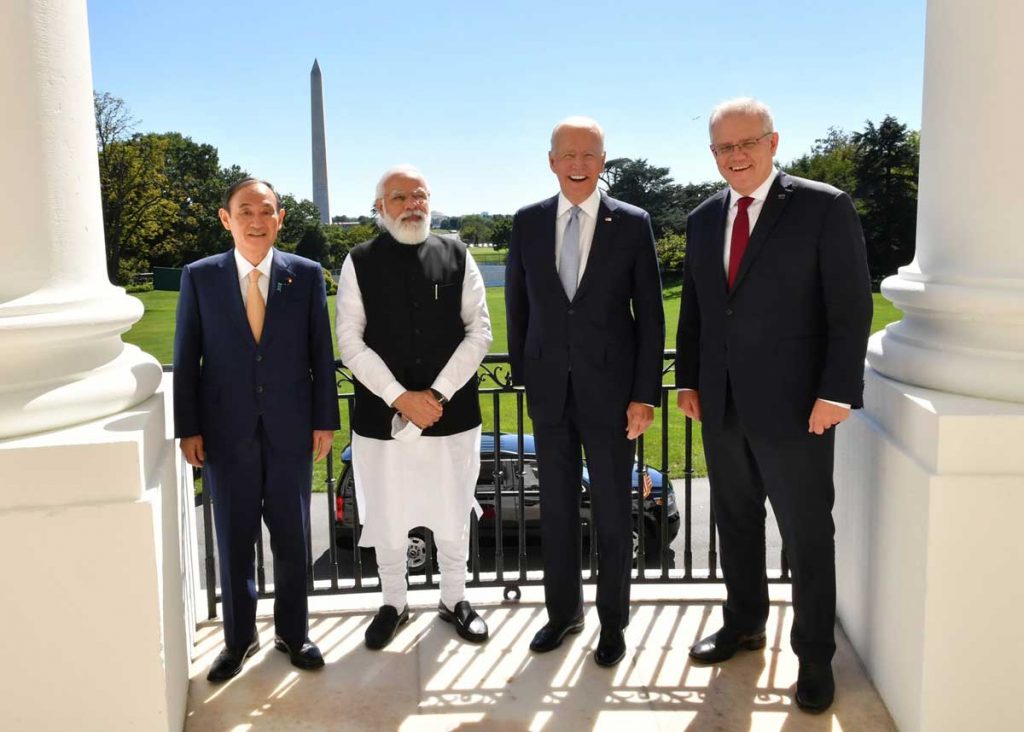
On the sidelines of the UN General Assembly and bilateral talks, the QUAD leaders met in a historic first-ever in-person summit. The QUAD was formed in 2017.
The leaders of the US, India, Japan, and Australia reaffirmed their shared vision of a free Indo-Pacific, asserting that the goal is for global good.
The QUAD had previously agreed to and is actively pursuing the production of 1 billion COVID-19 vaccines to address any potential shortage.
The countries will launch a ‘Quad Shipping Taskforce’ and will invite the ports including, Los Angeles, Mumbai Port Trust, Port Botany of Sydney, and Yokohama in Japan, to form a network committed to clean energy and decarbonization.
The nations will cooperate, innovate and implement critical and emerging technologies such as 5G and advanced Biotechnologies.
The QUAD will launch a senior Cyber Security Group to deal with threats and bolster an infrastructure that is resilient to cyber threats.
Further cooperation in Space activities, including sharing of the Satellite data, was discussed.
PM Modi has talks with Japanese Prime Minister
Prime Minister Narendra Modi met the Japanese Prime Minister Suga Yoshihide in Washington DC on September 23.
Mr. Modi congratulated the Japanese leader for hosting the Tokyo Olympics and Paralympic Games successfully despite the pandemic.
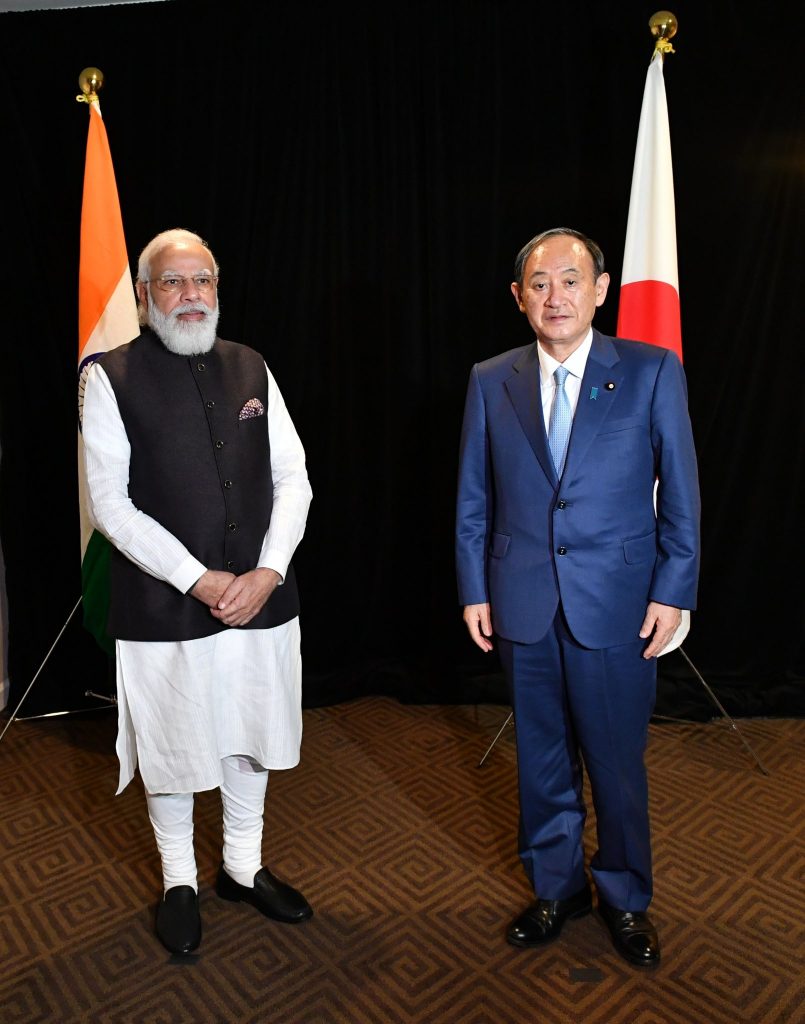
Although both leaders had spoken thrice on the phone since Mr. Yoshihide took office in September 2020, this is their first in-person meeting.
Committing themselves to a free Indo-Pacific region, both leaders agreed to strengthen cooperation in the area of defense equipment and technologies.
The Japanese PM informed PM Modi that the Japanese side would be undertaking skill and language tests in India from early 2022 to implement the Specified Skilled workers (SSW) agreement between the countries.
Evaluating the India-Japan Digital Partnership, they exchanged views on further collaboration in various emerging technologies.
Addressing climate change and the need for green energy, the leaders discussed a possible Japanese involvement in India’s National Hydrogen Energy Mission.
Both Prime Ministers welcomed the progress in the projects undertaken in India’s North-East, under the India-Japan Act East Forum.
PM Modi meets the US Vice-President
Prime Minister Modi met the US Vice-President on September 23. They had previously spoken in June.
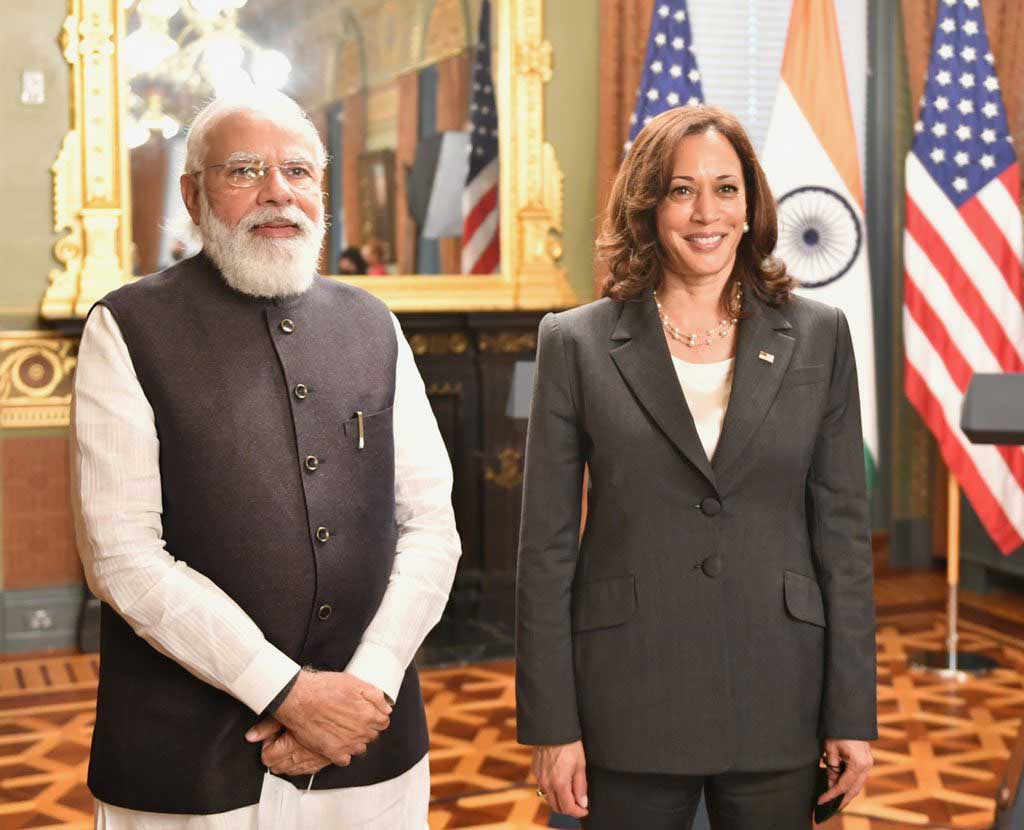
Both leaders discussed the COVID-19 situation and vaccination efforts and emphasized the uninterrupted supply of critical medicines and other healthcare equipment.
Talking of climate change, Prime Minister spoke of India’s National Hydrogen Mission. PM Modi stressed the significance of lifestyle changes to promote environmental sustainability.
Reaffirming their commitment towards a ‘free, open and inclusive Indo-Pacific region,’ the leaders also discussed the situation in Afghanistan.
Prime Minister Modi invited Vice-President Kamala Harris and Second Gentleman Douglas Emhoff to visit India. Ms. Kamala Harris’s mother, Shyamala Gopalan, hails from Chennai, India.
PM Modi talks to the Australian Prime Minister
Modi met the Australian Prime Minister Scott Morrison on September 23.
They spoke at the Virtual Summit held on June 4, when India and Australia’s ‘Strategic Partnership’ was raised to ‘Comprehensive Strategic Partnership.’
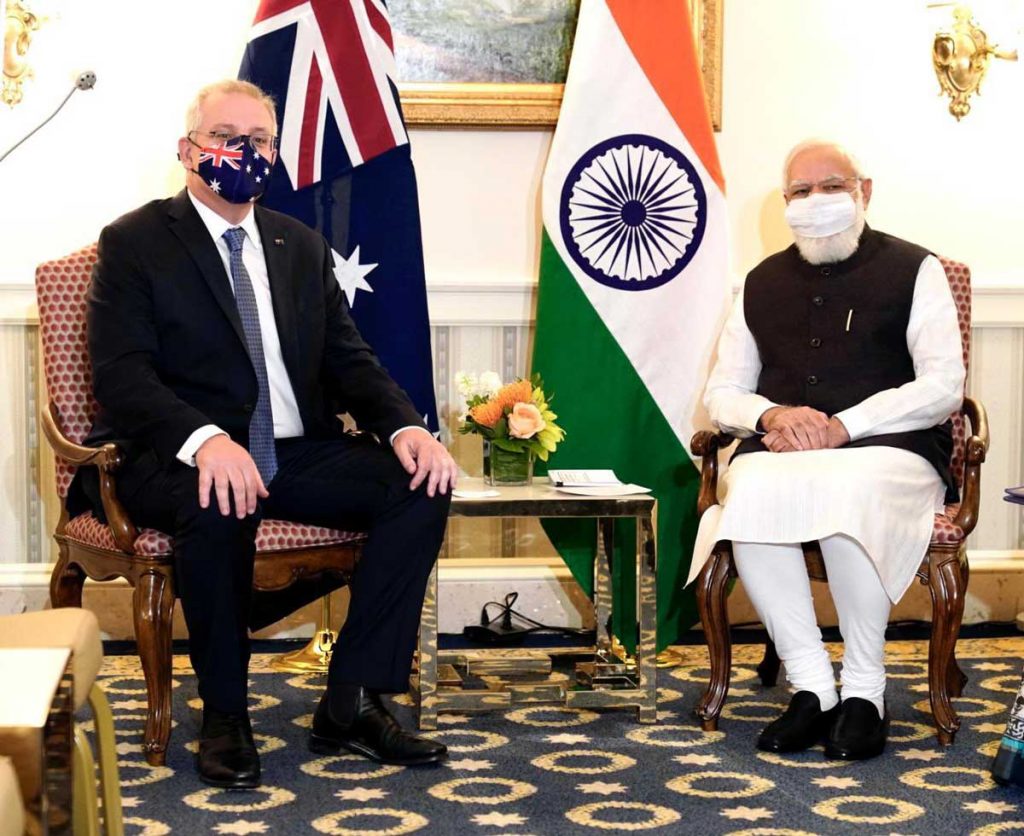
The leaders reviewed the progress since the meeting and reiterated their commitment to a free and open Indo-Pacific region.
India and Australia held their first Foreign and Defence Ministers 2+2 Dialogue early this month. The nations also have a bilateral Comprehensive Economic Cooperation Agreement.
Both Prime Ministers discussed the issue of climate change and the need for green energy. PM Modi stressed the need for a broader dialogue on the subject.
Also discussed was the subject of supply chain logistics, owing to the prevailing COVID-19 situation.
Prime Minister Modi invited Prime Minister Morrison to visit India.
Meetings with Business Leaders
PM Modi held a series of meetings with global business leaders.
Stephen Schwarzman, Chairman of Blackstone. Mr. Schwarzman expressed interest in further investments in India’s infrastructure and real estate sectors.
Vivek Lall, Chief Executive of General Atomics Global Corporation, and PM Modi discussed strengthening the defense sector in India and manufacturing in the country.
Mark Widmar, CEO of First Solar, discussed renewable energy with the Indian Prime Minister. India has set an ambitious task of 450 GW electricity generation from renewable sources by 2030.
Shantanu Narayen, President and CEO of Adobe, and Mr. Modi held discussions on Digital India and making use of the latest technologies in Health and Education.
The Indian PM discussed investment opportunities in the country’s telecommunications and electronics sectors with Mr. Cristiano Amon, CEO of Qualcomm.

 friendship in ink.
friendship in ink.